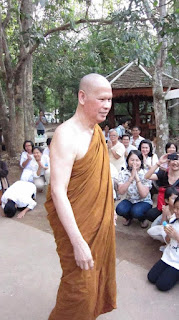The Teaching of Ajahn Suchart.
23 July 2023
Student: Do I understand it correctly that the Four Noble Truths can only be seen by meditation and wisdom or is it something that we can develop through the Noble Eightfold Path?
Than Ajahn: No, it's something you see whenever thing happens to you.
When you're angry, when you're sad, you have dukkha already whether you know it or not.
Then if you want to fix this dukkha, you have to see the cause of your dukkha which is your craving.
Your craving for something is the cause for you to have anger. You want something from your friend and your friend won’t give it to you then you get angry at your friend. If you don't want to get angry, then don't expect anything from your friend. So when your friend doesn't give you anything then you don't get angry at him.
So the Noble Truths are happening all the time.
You just don't see them because your mind is always looking at other things as the Four Noble Truths. You're looking at the external cause rather than the internal cause.
The real cause of your dukkha is the internal one i.e. your desire, your expectation or your craving—this is the one that's causing you dukkha.
The cause of your dukkha is not what you get or didn’t get.
You expect people to be nice to you so when they're not nice to you, you get angry at them.
You hate them. You feel bad. And you try to fix those people by trying to make them treat you nice. And if they don't treat you nice then you will always be angry at them.
But if you fix your craving or your desire for those people to be nice to you, and say, ‘Well, I cannot force them to be nice to me’ and you accept this truth and don't expect anything from them, then you will never get angry with anybody anymore.
So yes, the Four Noble Truths are working every day. They happen many times a day in your life. But you don't know that they’re happening because you keep looking at the objects of your desire. The object of your desire is what you go after. When you feel sad with that object, you didn't know that it's your craving that makes you feel sad. You say that it’s the object that causes you to have bad feeling, to feel sad, so you try to fix that object rather than fixing your craving.
So the Four Noble Truths happen all the time.
When you expect something and you don't get it then you feel bad—this is dukkha already. It happens many times a day without you knowing it if you don't have mindfulness to look inside your mind.
Because 99 percent of your time, you're looking outside. You're dealing with things outside so you don't see the Four Noble Truths that are happening inside.
That’s why you have to bring your mind inside. In order for the mind to be really inside, you have to enter into jhāna. That’s where the mind goes inside. Then when you come out of jhāna, you start to see things happening in your mind clearly. You will start to see cravings and stress when they come up and when they disappear. When your craving disappear, stress disappear.
What we talked about are theories. We talked about Four Noble Truths, Noble Eightfold Path, the magga and so forth—these are all theories. The reality is: thing is happening all the time.
But you don’t have the tool to look at the reality because your mind is being directed outward not inward.
You look at a different screen, let’s put it that way. There are two screens: outside screen and inside screen.
And you're looking at the outside screen all the time without looking at the inside screen so you don't see the Four Noble Truths that are happening in every action that you do practically.
So you want to switch your attention to a different screen, to look at the inner screen.
But it's hard to do this because you have to flip your mind 180 degrees. Instead of looking outward, you bring your mind inside by using mindfulness. Pulling your mind inside by focusing on something like reciting a mantra or on your body. Or your breath when you meditate.
Then your mind will go inside and leaves the sensual objects then you'll begin to see the mind and the actions that are happening inside the mind.
So when you come out of meditation, at least now you know that there's another screen you have to look at which is your mind. Before that, you never know that there's another screen to look at so you always look at the five sensual objects as your screen.
But as you progress in developing mindfulness and meditation, your mind will be more acquaintance with the inner screen. And you'll see both screens at the same time. You look at the outside but you also look at the inside because the inside is the one that controls the outside screen. What you do with the outside screen comes from the inside screen, comes from your mind, come from your thoughts. Is this clear enough to you?
Student: Yes. I understand now that the inside screen is looking into our mind to see that our mind is the cause of suffering and the outside screen is the sensual objects that our mind takes as being the cause of suffering.
Actually our greed, hatred and delusion are the cause of our suffering.
Than Ajahn: Yeah. By stopping your craving, your greed, hate and delusion, but not by stopping the sensual objects or managing/controlling the sensual objects.
People keep changing the sensual objects.
When you don’t like what you see, you change it.
You don’t like the furniture in your house, you change the furniture. You don’t like the paint in your house, you change it. You keep changing things all the time. But things never become satisfactory to you because the thing that got you to do all these changes is your craving. After you see the thing for a while, you become bored with the same thing so you want to change it.
You want something different. That's craving.
Student: Yes, that’s true. It’s very difficult to not prefer changes.
Than Ajahn: Because familiarity cause you to have stress or unhappiness. You're not happy when you see old familiar thing every day.
When you eat familiar food every day, you become sick of it. That’s because your craving wants something new all the time.
Student: That’s true. I admit that.
Than Ajahn: But if you can calm your mind and have jhāna, then you can suppress your craving then you can eat anything, eat the same old food every day, it doesn't matter. As long as you're hungry, you eat anything anyway.
Student: Ajahn mentioned there's another level which is wisdom which kills the delusion off permanently.
Than Ajahn: Yeah. You have to see that everything you crave for is impermanent and not under your control. It can change. You get something you like and then suddenly that thing changes and instead of liking it, you now hate it. Then this cause you dukkha (disappointment).
And it cause you sadness if you lose that thing that you like.
So when you see that everything will cause you dukkha sooner or later if you go after it, then it’s better not to go after thing. It’s better to stick to the emptiness that you have because it doesn’t hurt you. The emptiness never change. So eventually you learn to live with emptiness.
The Buddha said emptiness is the best form of happiness.
Nibbānaṃ paramaṃ sunnaṃ
Nibbānaṃ paramaṃ sukhaṃ
Nibbāna is the Supreme emptiness.
Nibbāna is the Supreme happiness.
So happiness and emptiness equal to nibbāna.
So happiness equals to emptiness. This is according to mathematics. A=B. B=C. Then C equals to A or B.
If A is Nibbāna equals to Supreme emptiness, and if A equals to Supreme happiness, then Supreme happiness equals to Supreme emptiness. So you want to get to the point where your mind can live with emptiness and be happy.
Because with the wisdom you see that having things will cause you to have dukkha regardless of whatever you have. They are all anicca. Sooner or later they will disappear or change.
And you cannot force them to remain permanent all the time, or to remain the same all the time.
This is wisdom, contemplation of the three characteristics of existence.
Everything is going to cause you dukkha sooner or later if you go after it. If you leave it alone, it will not cause you any dukkha. But if you start to possess or own it, then it will cause you dukkha. So eventually you come to the conclusion that it’s better to have nothing.
Because if you have nothing, then nothing can cause you dukkha.
It’s always something that can cause you dukkha; if you have nothing, then nothing can cause you any dukkha. So it’s better to live without anything.
Live with nothing. With having nothing, then there is no dukkha. With having something, there is always dukkha.
Student: Does this apply to jhāna as well?
Than Ajahn: Yes. Eventually jhāna is also considered as something. You don’t have to have jhāna, you don’t have to go to jhāna to be happy. You can be happy without jhāna, without anything. Just be right now. Right now. Be here and Now. And be happy with nothing.
When there is no craving, you will always be happy. Craving is the one that caused you to be dissatisfied then it will force you to go look for something to satisfy you. But nothing can satisfy you permanently. Okay?
Student: Yes, Than Ajahn. I will remember that equation. That’s brilliant.
Than Ajahn: Because the Buddha says ‘Nibbāna is emptiness. Nibbāna is happiness.’
So nibbāna equals to emptiness, equals to happiness. So emptiness must be happiness.
Which is true. When you have emptiness, there is nothing. The reason why you cannot live with emptiness is because you still have craving. It's the craving that cause you not to be satisfied with emptiness. But if you can get your mind into jhāna, when you come out of jhāna, you can be happy with nothing.
But when your jhāna wanes, then your desire comes up again then you have to use wisdom to tell your mind that it's better to have nothing than to have something. And when you see the truth of this then you will be convinced and say ‘Yeah, it’s better to have nothing.’ Then eventually you want to live with nothing and be happy with nothing. Okay?
Student: Yes. Thank you so much.
“Dhamma in English, Dec 13, 2022.”
By Ajahn Suchart Abhijāto
www.phrasuchart.com
YouTube: Dhamma in English.
https://www.youtube.com/channel/UCi_BnRZmNgECsJGS31F495






























